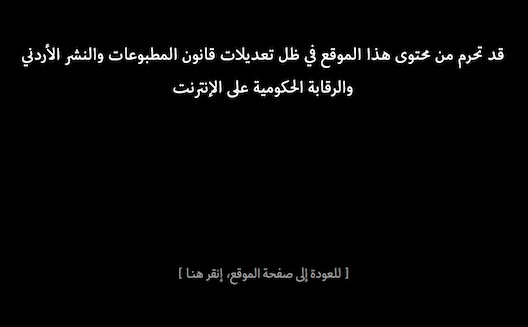The “Free Net” campaign joined forces with Jordanian online newspapers in an internet blackout day. Online websites, along with online news sites, decided to turn their pages black in protest of proposed legal restrictions. They announced the 28th of August, 2012 as internet blackout day. The blackout demanded press freedom before the passing of a bill restricting press and publication freedoms.
Among the restrictions proposed by the law:
- a permit for printed publication
- holding online websites accountable over published comments including:
- forcing the websites to filter visitors’ comments, and
- disregarding those comments if found not relevant to the published post or in case it was found to be fake, and
- forcing websites to register all visitors’ comments in a ledger for a period no less than six months.
The Free Net campaign strongly believes in the importance of freedom of speech and the press. This freedom provides access to information and news coming from Jordanian networks as the primary source of the local news. This enables a platform of a diverse opinions and points of view.
Engaging Solidarity Support
The new law requires all websites in Jordan to register and obtain a permit from the department of print and publication. All websites are to be treated as any printed press newspaper and subjected to the same laws. One of the bill’s articles gives the absolute authority to the general manager of the department of print and publication. The authority can block online websites published from abroad. The authority can block sites if they don’t meet the same restrictions as the local websites.
The Free Net campaign reached out to online news websites asking them to turn their pages black. Websites published a public announcement to their audience. “You May Not Access the Content of This Webpage if Print and Publication Laws are Approved.” They also asked social media activists to tweet using #BlackoutJO and #FreeNetJO. Their voices also raised awareness of the bill. Black pages took websites by storm. This meant thousands of people tasted how it could be in the case the bill was approved.

On Wednesday, the 28th of August, 2014, more than 500 websites blackened their webpages in solidarity with the Free Net campaign. Websites across Jordan, the Middle East, and the world announced their rejection of the restrictions of the press and publication laws. This showed great solidarity with the Free Net campaign in Jordan. A new campaign also started on social media. Thousands of tweets and Facebook comments were sent in support of the blackout of websites. Many Jordanians and Arab bloggers tweeted in support of Free Net or to raise awareness of the campaign. They hoped to raise awareness of the risks in accepting the restrictions over the press. This would be a huge setback in freedom of speech in Jordan.
Impact of the Blackout
The Free Net campaign was not successful in preventing the legal restrictions passed into law by the Jordanian parliament. The campaign did achieve major solidary with their website and social media allies. They were also able to raise public awareness in Jordan and the region about the impact of losing rights, such as freedom of expression and information.
Many websites were forced to register in the department of Print and Publication. This resulted in the arrest of a few journalists after publishing articles on their websites, as well as blocking the website, which broke the law.
The Free Net campaign was inventive in their approach to protesting restrictive laws to free speech. They employed a two-pronged approach seeking to prevent restrictions on freedom of expression. They used a symbolic action of a "blackout" to bring attention to their cause on social media. The blacking out webpages with a bold and provocative message raised awareness to the public. In their protest, they showed what life would be like if restrictive laws were passed. It was also a call to action. They demonstrated the importance of free expression and access to information. While the tactic in this context was not successful, it can provide creative ideas to share the "absence" of a right, such as free speech. When considering using such a tactic, use with caution and not in a way that would cause harm.
New Tactics in Human Rights does not advocate for or endorse specific tactics, policies or issues.